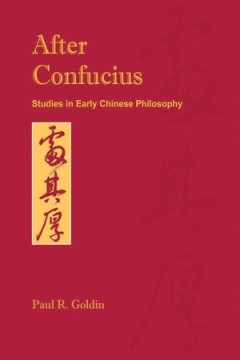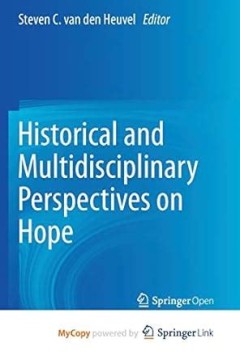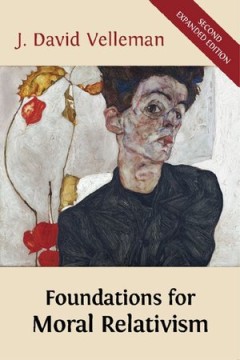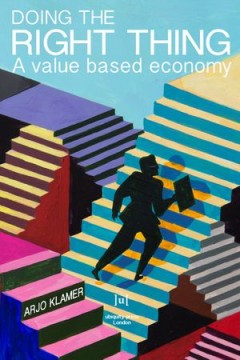Filter by

After Confucius : Studies in Early Chinese Philosophy
After Confucius is a collection of eight studies of Chinese philosophy from the time of Confucius to the formation of the empire in the second and third centuries B.C.E. As detailed in a masterful introduction, each essay serves as a concrete example of "thick description" an approach invented by philosopher Gilbert Ryle, which aims to reveal the logic that informs an observable exchange among …
- Edition
- -
- ISBN/ISSN
- 9780824828424
- Collation
- -
- Series Title
- Studies in Early Chinese Philosophy
- Call Number
- 100 GOL a

Transformational Ethics of Film = Thinking the Cinemakeover in the Film-Philo…
What is ‘the good’ of the film experience? And how does the budding field of ‘film as philosophy’ answer this question? Charting new routes for film ethics, Martin P. Rossouw develops a critical account of the transformational ethics at work within the ‘film as philosophy’ debate. Whenever philosophers claim that films can do philosophy, they also persistently put forward edifying p…
- Edition
- -
- ISBN/ISSN
- 9789004460874
- Collation
- 334 hlm; ill., lamp.,
- Series Title
- Value Inquiry Book Series, Volume: 365 Philosophy of Film, Volume: 365
- Call Number
- -

Historical and Multidisciplinary Perspectives on Hope
This open access volume makes an important contribution to the ongoing research on hope theory by combining insights from both its long history and its increasing multi-disciplinarity. In the first part, it recognizes the importance of the centuries-old reflection on hope by offering historical perspectives and tracing it back to ancient Greek philosophy. At the same time, it provides novel per…
- Edition
- 1
- ISBN/ISSN
- 9783030464899
- Collation
- XVI, 263 hlm; ill., lamp.,
- Series Title
- -
- Call Number
- -

Uncertain Bioethics : Moral Risk and Human Dignity
Uncertain Bioethics makes a significant and distinctive contribution to the bioethics literature by culling the insights from contemporary moral psychology to highlight the epistemic pitfalls and distorting influences on our apprehension of value. Stephen Napier also incorporates research from epistemology addressing pragmatic encroachment and the significance of peer disagreement to justify wh…
- Edition
- -
- ISBN/ISSN
- 9781351244510
- Collation
- -
- Series Title
- -
- Call Number
- -

The self, civic virtue, and public life: interdisciplinary perspectives
Introduction / Nancy E. Snow -- Can Feelings of Authenticity Help to Guide Virtuous Behavior? -- Civic Virtues, Wisdom, and Psychological Resilience -- Personal Liberty, Mutual Respect and Tolerance: From Values to Virtues -- Good Citizenship and Sustainable
- Edition
- -
- ISBN/ISSN
- 9781003367857
- Collation
- -
- Series Title
- -
- Call Number
- -

The Philosophy of Human Rights: Contemporary Controversies
The notion of "human rights" is widely used in political and moral debates. The core idea, that all human beings have some inalienable basic rights, is appealing and has an important practical function: It allows moral criticism of various wrongs and calls for action in order to prevent them. The articles in this collection take up a tension between the wide political use of human rights claims…
- Edition
- 1
- ISBN/ISSN
- 9783110263398
- Collation
- -
- Series Title
- -
- Call Number
- -

Foundations for Moral Relativism
In this new edition of Foundations for Moral Relativism a distinguished moral philosopher tames a bugbear of current debate about cultural difference. J. David Velleman shows that different communities can indeed be subject to incompatible moralities, because their local mores are rationally binding. At the same time, he explains why the mores of different communities, even when incompatible, a…
- Edition
- edisi 2
- ISBN/ISSN
- 9781783740345
- Collation
- -
- Series Title
- -
- Call Number
- -

Metaethics from A First Person Standpoint: An Introduction To Moral Philosophy
Metaethics from a First Person Standpoint addresses in a novel format the major topics and themes of contemporary metaethics, the study of the analysis of moral thought and judgement. Metathetics is less concerned with what practices are right or wrong than with what we mean by ‘right’ and ‘wrong.’
- Edition
- 1
- ISBN/ISSN
- 9781783742004
- Collation
- -
- Series Title
- -
- Call Number
- -

Minimal Ethics for the Anthropocene
Life typically becomes an object of reflection when it is seen to be under threat. In particular, humans have a tendency to engage in thinking about life (instead of just continuing to live it) when being confronted with the prospect of death: be it the death of individuals due to illness, accident or old age; the death of whole ethnic or national groups in wars and other forms of armed conflic…
- Edition
- 1
- ISBN/ISSN
- 9781607853299
- Collation
- -
- Series Title
- -
- Call Number
- -

Doing the Right Thing: A Value Based Economy
This book is for all those who are seeking a human perspective on economic and organizational processes. It lays the foundations for a value based approach to the economy. The key questions are: “What is important to you or your organization?” “What is this action or that organization good for?” The book is directed at the prevalence of instrumentalist thinking in the current economy an…
- Edition
- 3
- ISBN/ISSN
- 9781909188938
- Collation
- -
- Series Title
- -
- Call Number
- -
 Computer Science, Information & General Works
Computer Science, Information & General Works  Philosophy & Psychology
Philosophy & Psychology  Religion
Religion  Social Sciences
Social Sciences  Language
Language  Pure Science
Pure Science  Applied Sciences
Applied Sciences  Art & Recreation
Art & Recreation  Literature
Literature  History & Geography
History & Geography